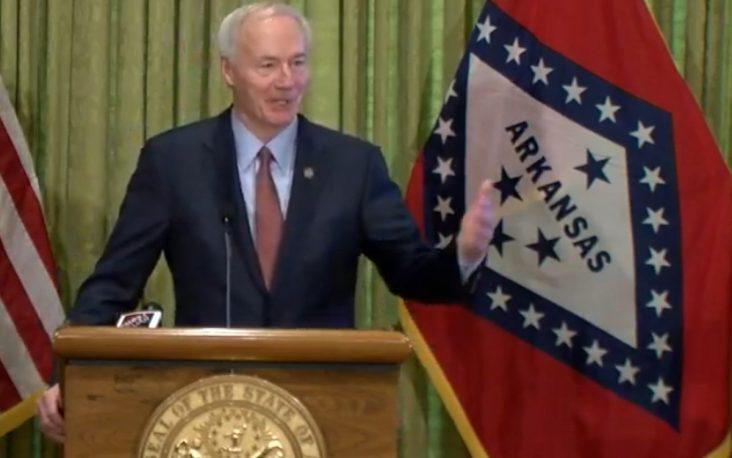$116 million plan proposed to help rural Arkansas hospitals, nurses and other medical needs
by March 26, 2020 3:55 pm 22,403 views

Gov. Asa Hutchinson on Thursday (March 26) rolled out a $116 million plan to support rural hospitals, increase pay for nurses, provide workforce training and other measures as the healthcare system responds to forced changes because of COVID-19. The plan will require federal approval.
COVID-19 cases in Arkansas rose from 280 on Wednesday to 335 as of early afternoon Thursday. There were two deaths reported Tuesday, with a third death reported Thursday. As of Thursday at 2 p.m., there were 76,514 U.S. cases and 1,093 deaths. Globally, there were around 511,603 cases and more than 23,000 deaths.
There were 41 hospitalizations in Arkansas as of Thursday, a considerable rise from the 12 COVID patients reported hospitalized on Wednesday. Of those in the hospital, 13 are on ventilators, up from four on Wednesday. Arkansas Secretary of Health Dr. Nate Smith said part of the rise is because the state has improved its data collection process.
“Part of that [rise in numbers] is that we are using a different way of collecting that information from the hospitals,” Smith said during Thursday’s press conference.
Gov. Hutchinson said the state is working through Medicaid to push a plan that will help keep the doors open for rural hospitals, provide extra pay for nurses on the frontline of the medical emergency and even provide help for the homeless to ensure they can be safe and isolated when necessary.
Following is an outline of key parts of the plan.
• $55 million for increased nurse pay.
The money would provide an additional $1,000 month for nurses and $2,000 a month for nurses in facilities with COVID patients.
“This will be in direct support for nurses and help in the recruitment of those nurses,” Gov. Hutchinson said.
• $19 million for workforce safety and training measures
• $15 million for capital improvements for hospitals with 65 beds or less
The funds could be used for capital improvement projects like drive-thru test sites and isolation centers.
• $5 million for healthcare and other support for the homeless
Department of Human Services Secretary Cindy Gillespie said the fund will be used to encourage the homeless to not congregate and provide healthcare.
• $1.4 million for uninsured Arkansans
Another part of the plan would include an extra $500 a month for foster care parents.
Gov. Hutchinson said the federal portion – if the plan is approved by the U.S. Center for Medicaid Services – will cover all but $25 million of the $116 million plan. The $25 million will come from an adjustment of Medicaid dollars and will not come from the state’s general fund. The governor said early discussions with federal officials have been positive and he hopes for quick approval of the state’s waiver. Dennis Smith, with Arkansas DHS, called the plan a “demonstration project” because Medicaid dollars are typically not allowed for such purposes.
“This is getting outside the Medicaid box,” Smith said, adding later “we are hopeful for a swift and favorable approval.”
EQUIPMENT RELIEF, SELF QUARANTINE GUIDANCE
University of Arkansas for Medical Sciences Chancellor Dr. Cam Patterson also reported during the press conference the state will soon receive millions of pieces of protective personal equipment (PPE).
Gov. Hutchinson recently authorized the release of $30 million from the Department of Finance and Administration for the purchase of PPE. Patterson said deliveries should begin this weekend, with the state set to receive 3 million N95 masks, 4 million surgical masks, 4 million gowns, 2.1 million face shields and 7 million gloves. The shipments will be delivered to the state’s surplus warehouse in North Little Rock and then distributed from there.
The Arkansas Department of Health announced Thursday it is recommending self home quarantine for 14 days for all travelers from New York State and all international locations.
“This is due to high rates of COVID-19 in New York as well as in a growing number of international locations. In the interest of the public health, all travelers who return from one of these locations are advised to quarantine at home for 14 days, starting from the date they left that location. If you develop fever, cough, or other symptoms of COVID-19, you should contact your doctor for advice on where to be evaluated,” noted the ADH statement.
Details of home quarantine, according to the ADH, include:
• Remain at home and avoid all public activities. That means do not go to work, church, school, stores (including grocery stores), nor any public events or places;
• Do not have visitors in your home;
• If you live in a home with other people, stay in a separate room. If that is not possible, wear a face mask when you are in the same room and stay at least 6 feet away from them;
• Do not leave your home except to get medical care. If you need to see a doctor for reasons other than a medical emergency, please call your medical provider to discuss the care you need;
• In the event of a medical emergency, call 911. Tell them that you are in self home quarantine for novel coronavirus exposure. Keep a face mask on until a health care provider asks you to remove it; and
• Check yourself for a fever twice a day. This means taking your temperature in the morning and before bed at night. Write it down in a log or piece of paper.
